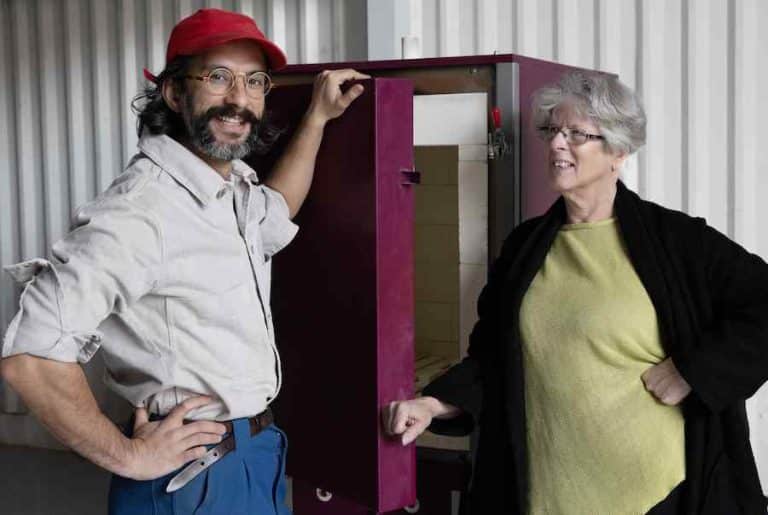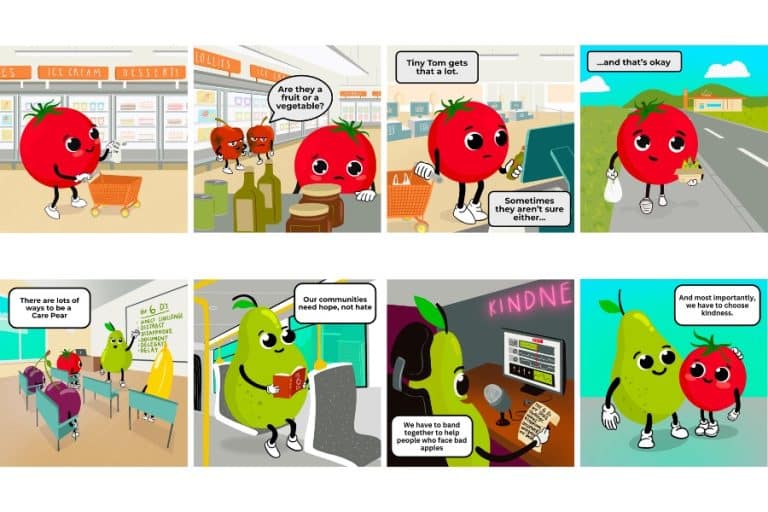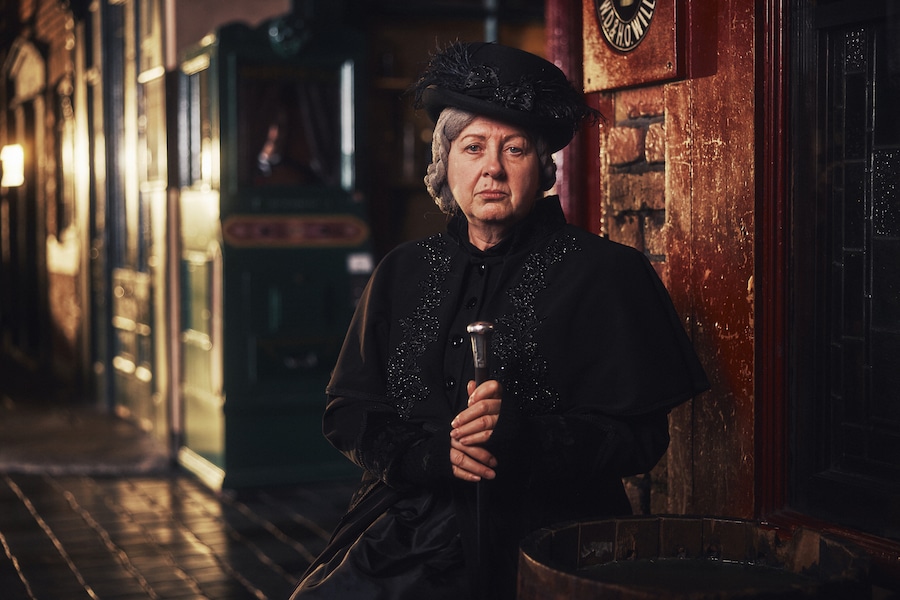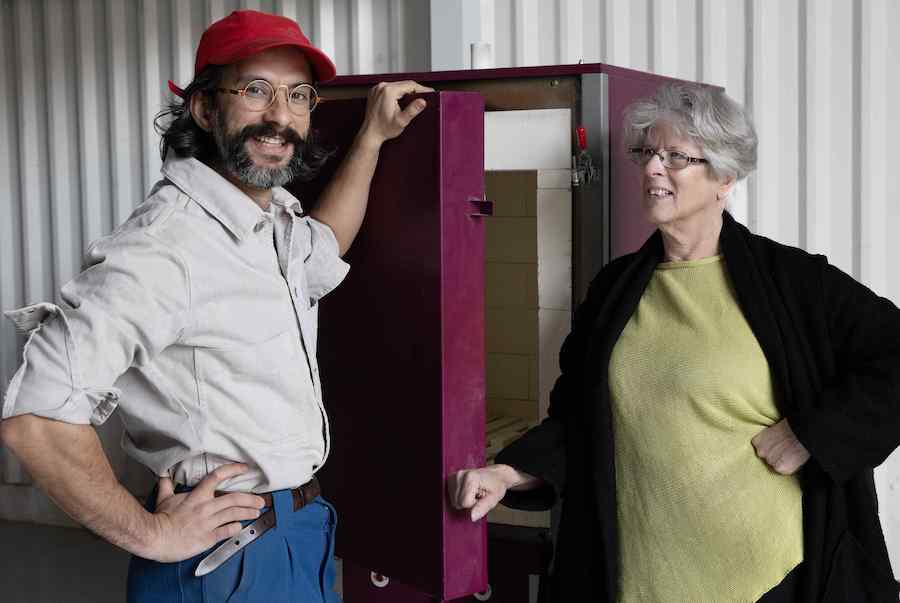Cheddar Gorgeous joins forces with Manchester’s George House Trust to fight HIV stigma
- Written by Thom Bamford
- Last updated 2 years ago
- Charity

Cheddar will be joining the TV producer and screenwriter, Russell T. Davies, who was appointed as the charity’s first patron back in 2015.
Cheddar has been an ambassador at George House Trust for over a decade, using their platform to raise awareness about HIV and challenge HIV stigma.
During the fourth season of RuPaul’s Drag Race UK, Cheddar made a disruptive contribution to the ‘Tickled Pink’ runway, wearing an iconic outfit inspired by the ACT UP movement of the 1980s and 90s, which featured pink triangles and the ‘Silence = Death’ slogan.
They then led a powerful conversation in the Werkroom about the complex relationship between HIV, homophobia, and shame.
Cheddar also took the opportunity to educate viewers on the realities of HIV today, including the fact that someone living with HIV and on effective treatment can’t pass it on during sex, which is known as U=U (Undetectable Equals Untransmissible).
For Cheddar, representation on platforms like RuPaul’s Drag Race UK is important, but it’s equally crucial to ensure that these moments of recognition translate into calls for action.
We spoke to them about their new role at George’s House Trust, the realities of living with HIV today, and how we can all help tackle the stigma of HIV.

How did you first get involved with the George House Trust, and what inspired you to become an ambassador for the charity?
“I became an ambassador for GHT because of my involvement with drag and the LGBT community in Manchester.
“It just felt like a natural fit to be able to use my platform and my visibility as a drag queen to help raise awareness for the important work that GHT does in the community.
“For me, it’s always been really important to be able to use my platform for good and to give back to the community that has given me so much. Being an ambassador for GHT is just one way that I can do that.
“GHT does incredible work in the community, providing support and advice for people living with HIV and AIDS, as well as campaigning for better rights and services for people who are affected by the virus. I think it’s just so important that we continue to support and champion the work that they do.
“I think drag queens have always been at the forefront of LGBT activism and visibility, and it’s because drag is such a visible and powerful art form.
“Drag queens can use their platforms and their art to challenge and subvert traditional gender norms and expectations, and to celebrate and champion diversity and individuality.
“And I think that’s something that resonates with people, and it’s something that can help to change hearts and minds around LGBT issues.
“We’ve seen that over the years with the incredible work of drag queens like RuPaul, Divine, and Lady Bunny, who have all used their art to challenge and subvert traditional gender roles and to raise awareness and visibility for LGBT causes.
“And I think as drag continues to become more mainstream and more visible, it’s only going to become more powerful as a tool for social change.”
In your opinion, what are some of the biggest challenges facing people living with HIV today, and how can we work to address them?
“I think the most important thing is to know that you’re not alone.
“There are so many people out there who have been through what you’re going through, and who are going through it right now.
“And there are so many resources and support networks available to help you through it.
Whether that’s talking to friends or family, reaching out to a support group or a therapist, or even just finding online communities or forums where you can connect with other people who are going through similar experiences.
“It’s important to remember that it’s okay to take your time and to go at your own pace.
“There’s no rush, and it’s important to be kind and patient with yourself as you navigate this journey.
“Ultimately, I think it’s about finding a community and a support network that you feel comfortable and safe in, and that can help you to embrace and celebrate your own identity and your individuality.
“One of the most pressing issues surrounding HIV is the need to keep it on the public agenda.
“With advancements in treatments and longer life expectancies, it’s understandable that the intense fear-driven campaigns of the 80s and 90s have faded away.
“While this is certainly a positive development, it has also had the unintended consequence of minimising the importance of HIV as a major health issue.
“It’s important to recognise that the minimisation of HIV is convenient for some individuals and organisations.
“By downplaying its significance, there is less need for funding for vital resources like PrEP. Unfortunately, this minimisation is based on a falsehood: HIV is not an issue that could potentially affect the lives of individuals, regardless of their sexual orientation, gender, or any other factor.
“We cannot afford to return to a time when HIV transmissions were on the rise. Even when the number of new cases is zero, we must continue to allocate resources and maintain vigilance to ensure that HIV remains a priority on the public health agenda.
“This requires funding for resources like condoms, PrEP, and other preventative measures that can help to reduce the number of new cases of HIV.
“In addition to the need for continued funding, there is still a great deal of stigma and misinformation surrounding HIV.
“Despite the focus on HIV in the 80s and 90s, many people still do not understand the virus, how it’s transmitted, or the importance of resources like PrEP. This lack of education is not limited to the general public – even medical professionals may not be aware of the latest advances in HIV prevention and treatment.
“It’s crucial that we work to tackle the stigma faced by individuals living with HIV.
“This stigma can come from both within and outside of the LGBTQ+ community and can have serious negative consequences for individuals’ mental health and well-being. By talking openly and honestly about HIV, we can remove the shame and stigma surrounding it, and create a more supportive and compassionate society.
“By addressing these issues – the need for continued funding, education and awareness, and the reduction of stigma – we can work towards a world where new HIV transmissions simply do not happen anymore.
“This is a lofty goal, but it’s one that we can achieve through collective effort and determination. And even as we work towards this goal, we must remember that the fight against HIV is far from over. We must remain vigilant, continue to allocate resources, and work together to create a society where everyone can thrive, regardless of their HIV status.”
How difficult is it currently to get treatment for PrEP in the UK?
“It’s an issue, right? And it’s an issue that is NHS-wide because obviously a lot of services have been cut.
“So I don’t in any way wish to suggest that there is somehow an additional minimisation of sexual health services, but I think it’s certainly one of those services that could very easily be dictated by moral rhetoric.
“And by that, I mean it’s really easy for people to turn around and go, ‘Those people deserve what they’re going to get. Those people should think better, better care of themselves.’
“And I think whilst there’s absolutely some pain, that you need to give people the opportunity and the education to be able to make safer choices.
“So maintaining sexual health services is so important. I mean, I was very lucky. So, I’m an avid user of PrEP. I think PrEP has been a wonderful thing in my own life, but also within my community, in terms of shifting my relationship with sex as a gay person, sure.
“But I’m trying to get hold of it these days, and the systems that are now in place around sexual health services make that so hard. So to get an appointment these days, you often have to go through some kind of weird early morning email system before you even get on the phone with somebody, before you were even actually able to try and carve out an appointment.
“And I think for many people, it becomes easier just to let that thing slide, and I think that’s what I said. It’s careful around complacency now.
“I was fortunate enough to do a little collaboration with Dean St. here with a big clinic down in London, and they have a really, really amazing service in which you can essentially order PrEP from home and do your sexual health tests from home.
“We need to start working more to those kinds of models where we can minimise the pressure on the NHS and minimise the pressure on sexual health services in sharp, and but at the same time make sure that people are getting the medication they need to look after themselves and each other.”
What steps can we take to combat the stigma surrounding HIV-positive individuals and improve their overall quality of life?
“I believe that sexual health is a topic that requires ongoing attention and concern, and we must recognise that it is often interconnected with other issues in our lives. I think it’s important to highlight the work that George House Trust is doing in collaboration with other partner agencies to address issues like chemsex and mental health. These issues are crucial because they play a role in both new transmission and in the care of people living with HIV. Moreover, these issues are often related to each other, creating a complex web of challenges that people have to face.
“One of the most significant challenges is stigma, which creates the idea that people living with HIV cannot find happiness or love, and they cannot have a normal sex life. This can cause people to spiral into dark places and can have a significant impact on their mental health. Although there are many people out there who are positive and functioning well, there are also many who struggle with these issues. The struggles they face are often interconnected with other issues, which can lead to a range of negative outcomes.
“For example, I recently did research with Survivors Manchester and George House Trust about the relationship between consent, sexual health, HIV, and chemsex. Through this research, I spoke with a nurse who worked in palliative care and saw a high frequency of people who became involved in chemsex going into a spiral where they no longer wanted to take their medication or look after themselves. This led to them ending up in a palliative care situation where HIV was the cause of their death. This is a situation that should not be happening, and we need to work together to address the issues that underlie it.
“Overall, I think that the work of George House Trust in recognising the interconnectedness of issues and addressing them together is a significant step forward. By supporting each other, we can create a better understanding of the issues that people living with HIV face and work towards finding effective solutions that support their health and well-being.”
The George House Trust is an amazing charity organisation based in Manchester, UK, that provides support and advocacy services to people living with HIV/AIDS.
The charity was established in 1985 and was named after George House, a prominent local activist who died of AIDS in 1984.
The organization provides a range of services to people living with HIV/AIDS, including emotional and practical support, access to treatment and medication, housing advice and support, and peer support groups. They also offer education and training programs to raise awareness about HIV/AIDS and reduce the stigma associated with the disease.
The George House Trust is staffed by a team of dedicated professionals and volunteers who are committed to improving the lives of people living with HIV/AIDS. The organisation relies on donations and fundraising events to support its work and has a strong track record of delivering high-quality services to its clients.
You can check out George House Trust’s amazing work by visiting their website by clicking here.
- This article was last updated 2 years ago.
- It was first published on 6 April 2023 and is subject to be updated from time to time. Please refresh or return to see the latest version.
Did we miss something? Let us know: [email protected]
Want to be the first to receive all the latest news stories, what’s on and events from the heart of Manchester? Sign up here.
Manchester is a successful city, but many people suffer. I Love Manchester helps raise awareness and funds to help improve the lives and prospects of people across Greater Manchester – and we can’t do it without your help. So please support us with what you can so we can continue to spread the love. Thank you in advance!
Got a story worth sharing?
What’s the story? We are all ears when it comes to positive news and inspiring stories. You can send story ideas to [email protected]
An email you’ll love. Subscribe to our newsletter to get the latest news stories delivered direct to your inbox.

Step into another world this winter with Tattu’s incredible culinary creations

Community unites in heartfelt support for late footballer’s family

Rooted in family, grown in the community – the family business inspiring potters for 25 years

Meet the pear, tomato and banana who are changing the way we fight hate crimes in Manchester

The failed utopian housing project that became a bohemian counterculture ‘paradise’

















